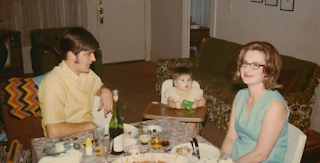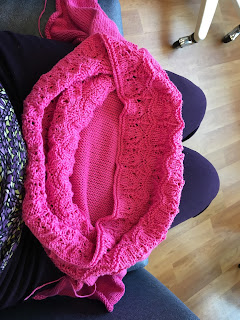1. I started (and was discharged from) OT for the lymphedema. The swelling is still there, but it's not quite as bad and--what you really hope for--it hasn't gotten worse. I have been measured for custom compression garments, but they haven't arrived yet, so I'm still wearing the (very ratty) temporary stuff.
2. I've quit wearing my daytime TMJ brace. My teeth aren't perfectly back to normal, but so far, so good with only the night brace.
3. I've graduated from the post-surgery compression garments. It timed perfectly with the fall weather and drop in temps by 10-20 degrees, so just when an extra layer wouldn't have been the worst thing. :) It's still very nice to be done with that.
4. I got my baseline bone density scan (I'm average, which is good). As long as I'm on aromatase inhibitors, I'll get them regularly to check for osteoporosis.
5. I took two weeks off of the Arimidex and the bone aches almost completely disappeared! So now I'm trying out Femara. I appreciate any non-achy vibes sent my way!
6. I picked up a cold somewhere, which seems to hit me extra hard. I'm still so tired, that adding one more thing wipes me out. But I'm pulling out of that, too.
7. And I lost my mother (obituary here). Although she technically died from pneumonia, it was cancer that killed her. In 2008 she was diagnosed with Stage 4 lung cancer. At the time of her diagnosis, the median survival time of those diagnosed with stage 4 lung cancer was 8 months. The 5 year survival rate was 4%. My mom made it 8 1/2 years post-diagnosis. She was able to move near me (more importantly, near her grandkids), and to get treatment at Froedtert, which no doubt prolonged her life. She had two recurrences (to her lungs again, and then to her brain), and each time, cancer took a little more from her life. By the last few years of her life, it had taken so much. She lost the ability to be self-sufficient. She lost the ability to walk. Her hearing deteriorated, and while hearing aids may have helped a little, they didn't fix things. And the cancer changed her from one of the most outgoing, giving, social people I've ever known to someone who turned more and more into herself. I don't think it bothered her, but I selfishly wanted the mom who'd I'd grown up with--the mom who I would talk to multiple times a day, and that was the first person I wanted to tell about everything I did, and everything my kids did.
Cancer also took my dad, 13 1/2 years ago, at age 62. It was a different cancer, agnogenic myeloid metaplasia, and it took him sooner after diagnosis. In 2002, there were very few treatments, and none of them worked for him.
I have other relatives who have battled different cancers. One of my first appointments post-diagnosis was with the genetic counselor, who mapped out my pedigree, with squares and circles, some filled and some open. I had genetic testing done for the 17 most common genes known to be linked to breast cancer. I tested negative for all of them. The other cases of cancer in my family are varied types. There's not a definite link between my parents' cancers and mine. As has been shown, the majority of cancer cannot be traced to genetics. Whether it's just bad luck, or environmental exposures and behavioral choices, lots of people are getting cancer. But as we are living longer, our ability to screen for things like cancer is improving, and best of all, more people are living--and living longer--after diagnosis. I try not to think about what that means if my dad (or my mom) had been diagnosed even a few years later. What it DOES mean is that there's not necessarily a "legacy of cancer"--at least not genetically. It is good to know about screenings and things to watch for, but that's something that everyone should do, regardless of family history. The American Cancer Society no longer recommends breast self exams, but they DO recommend being familiar with your own breasts, so that you know if something changes. I think that's true about your body in general. YOU know your body best and if something seems off, find out why.
The one thing I will take from my mom's cancer story is how she broke the odds. Time and time again, her doctors and nurses would tell her how tough she was. She was a role model to me for not listening to the statistics. It's tough, but in the end, even the best statistical predictions have only a 99% confidence interval. That's plenty of room for exceptions. :)
























